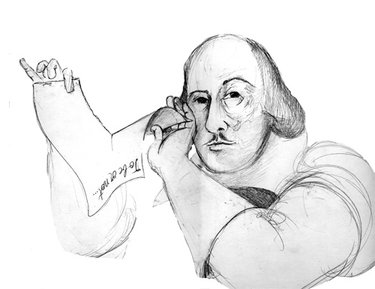From the editor
Marginal progress after two score years
Illustration by Forest Byrd
Both my husband and I are readers and writers, ink-stained wretches, to use Samuel Johnson’s phrase. Although we’ve been together nigh onto 40 years, our books have never married.
We maintain separate libraries. My husband has many fine old volumes, some of them rare first editions he ferreted out and saved for, carefully preserved in neatly arranged glass-fronted shelves. Their spines are leather; some of their pages are gilded. He treasures them as much for their beauty and age as for their words. He respects them as objects that are part of a history that will outlast him.
My books are largely paperbacks. They are scattered about, hither and yon, leaning in large piles around various projects. Their corners are dog-eared, their pages are scrawled with my notes. I exclaim in their margins when I agree and argue when I don’t. I can read my own history on their pages, remembering how I felt as a girl, or what I thought as college student or a young mother.
Although Gary and I knew from our first meeting in college that we shared a love of literature and spent much of our courtship exchanging books and letters about books, we discovered early in our marriage a gaping difference. I should have realized the difference from the time we spent together working at my parents’ weekly in the Adirondacks. My mother wrote a “Yesteryears” column in which she explored local history. And, in the days before there was such a thing as computer scanning, she cut the pages of a book to illustrate one of her columns. To her, it was a practical way to share something she cared about.
Gary was horrified. To him, it was a desecration.
But still, I didn’t see it coming. When we were first married, we had very little money. Gary had just started work as a reporter for a big city daily; I was teaching undergraduates as I worked on my Ph.D. in English literature. Studying for my comprehensive exams, I set out to read every word Shakespeare had written. I was pregnant with our first child and decided that the Bard was meant to be read out loud, so our unborn child would hear his words, all of them, as I studied.
Although I had many of Shakespeare’s plays in paperback, I didn’t have them all; and I lacked his sonnets. My husband had a single huge volume, with onion-skin pages that held all his works. He allowed me to borrow it.
Thinking I was being sensitive to his predilections, I decided not to run rampant over the pages with highlighter or to scrawl in ink in the pristine margins. Instead, I used the lightest of pencils, made the finest of lines, as I worked my way through the Bard’s words. I had honestly intended to erase the marks when I was through but discovered, much to my chagrin, this created troublesome smudges, which were far more noticeable than the penciled lines.
My husband never forgave me. Over the years, whenever I asked to borrow a book, he always reminded me of my transgression. It was, after all, his book and I had treated it as my own.
So this past Monday night when I came home late from work, I was both puzzled and intrigued to find that day’s New York Times at my place at our dining table, opened to a story by Dirk Johnson “Bibliophiles Fear a Dim Future for Scribbling in the Margins: An Uncertain Fate For an Old Practice in a Digital World.”
My husband and I both work long hours and frequently see little of each other, so the things we leave at each other’s place at the table take on added importance.
The Times story was illustrated with a picture of a book in which Mark Twain had scribbled. The book, Johnson explained, was about making a profit in publishing. Twain wrote that “nothing could be stupider” than using advertising to sell books as if they were “essential goods” like salt or tobacco.
Dirk Johnson wrote about how marginalia was more common in the 19th Century naming Samuel Taylor Coleridge, William Blake, and Charles Darwin as margin writers than in the 20th Century when, he wrote, “it mostly came to be regarded like graffiti: something polite and respectful people did not do.”
Johnson went on to report that the oral historian Studs Terkel told his friends that reading a book should be raucous conversation rather than a passive exercise. And he noted that, when Nelson Mandela was imprisoned in South Africa in 1977, a copy of Shakespeare was circulated among the inmates. Mandela wrote his name next to this passage from Julius Caesar: “Cowards die many times before their deaths.”
My heart pounded. Surely, my scrawling couldn’t be compared to the likes of these writers but, still, there was a thread throughout the article, tracing the worth of interacting with a text by the reader’s adding words that couldn’t be ignored.
So what if my husband were sound asleep. I needed to ask him: “Is this an olive branch?” I shouted, rousing him as I waved The Times over his head.
“Yes,” he said.
I decided it would be too much to make note of that in the margin of his Shakespeare collection. But I think I’ll carefully tuck the article inside its front cover.
Melissa Hale-Spencer



